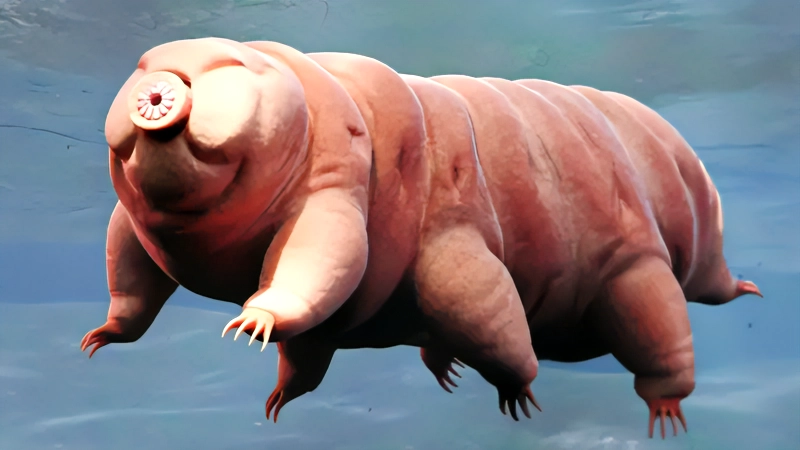 1019-不死之身——胖胖虫原创
1019-不死之身——胖胖虫原创
# 翻译 Oct.16 · 2022

Tardigrades may have survived spacecraft crashing on moon
水熊虫在宇宙飞船坠毁月球后或还幸存
The Israeli Beresheet probe was meant to be the first private lander to touch down on the moon. And all was going smoothly until mission controllers lost contact in April as the robotic craft made its way down. Beyond all the technology that was lost in the crash, Beresheet had an unusual cargo: a few thousand tiny tardigrades, the toughest animals on Earth.
以色列Beresheet探测器本应该是第一个登陆月球的私人登录器。在四月份机器人飞船降落时,任务控制员与飞船失去联系之前,一切都进展顺利。除了在事故中丢失的所有技术资料,Beresheet还有一件不寻常的货物:数千只微小的水熊虫,地球上最顽强的动物。
Israeli:以色列
probe:探测器
lander:登录器(类似着陆仓这种
touch down:登陆、着陆
smoothly:一切顺利地
robotic:机械的、机器的
craft:飞船
Beyond:除了、超过
tardigrade:水熊虫 (opens new window)
toughest:最顽强的、最坚韧的
Tardigrades have fascinated scientists since their discovery in the 18th century. They have been found on mountain tops, in scorching deserts, and lurking in subglacial lakes in Antarctica. They survived being frozen in liquid helium and being boiled at 149C.
自从18世纪缓行动物被发现以来,就一直吸引着科学家们。它们已经被发现存在于很多的山顶,在很多灼热的沙漠里,以及潜伏在很多南极洲冰层下的湖泊中。他们在被液氦(-269度)冻僵后,以及在149度下煮沸后幸存下来。
fascinated:这里是have done结构后的现在分词,动词表吸引着,即一直吸引着科学家研究。
scorching:adj.灼热的
lurk:潜伏在
subglacial:冰下的
Antarctica:南极洲
liquid helium:液氦(零下269度)
being frozen 、being boiled:都是被动语态,表示被冷冻,被煮沸
"Tardigrades can survive pressures that are comparable to those created when asteroids strike Earth, so a small crash like this is nothing to them, " said Lukasz Kaczmarek, a tardigrade expert and astrobiologist.
缓行动物专家,天体生物学家LK说到:“缓行动物可以在相当于小行星撞击地球所产生的压力下生存下来,所以一个像这样的小坠毁对它们来说并没有什么。”
comparable:相比于、相比
asteroid:小行星
astrobiologist:天体生物学家
"They cannot colonise the moon because there is no atmosphere and no liquid water, " Kaczmarek said. "But it could be possible to bring them back to Earth and then add the water. They should resurrect."
LK说到:“它们不能殖民月球,因为那里没有大气也没有液态水,但有可能将它们带回地球然后给它们加水,它们应该能复活。”
colonise:殖民
liquid:液态的
resurrect:v.复活
# 生肉 Oct.16 · 2022
Tardigrades may have survived spacecraft crashing on moon
The Israeli Beresheet probe was meant to be the first private lander to touch down on the moon. And all was going smoothly until mission controllers lost contact in April as the robotic craft made its way down. Beyond all the technology that was lost in the crash, Beresheet had an unusual cargo: a few thousand tiny tardigrades, the toughest animals on Earth.
Tardigrades have fascinated scientists since their discovery in the 18th century. They have been found on mountain tops, in scorching deserts, and lurking in subglacial lakes in Antarctica. They survived being frozen in liquid helium and being boiled at 149C.
The tardigrade's secret is the ability to shrivel into a seed-like pod, expelling nearly all of its water and slashing its metabolism. In this "tun" state, the animals can hunker down and survive conditions that would normally be swiftly fatal.
"Tardigrades can survive pressures that are comparable to those created when asteroids strike Earth, so a small crash like this is nothing to them, " said Lukasz Kaczmarek, a tardigrade expert and astrobiologist.
"They cannot colonise the moon because there is no atmosphere and no liquid water, " Kaczmarek said. "But it could be possible to bring them back to Earth and then add the water. They should resurrect."
